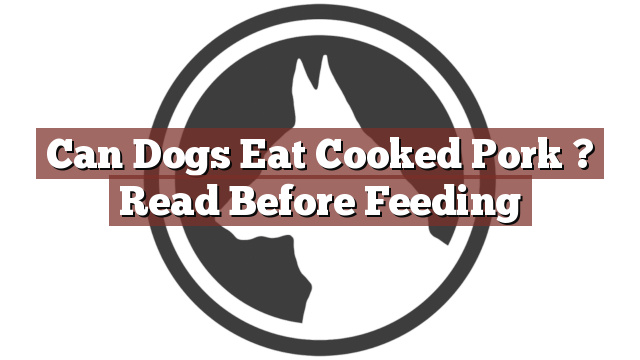Understanding Your Dog’s Dietary Needs
As a responsible pet owner, it is crucial to provide your furry friend with a well-balanced and nutritious diet. Understanding your dog’s dietary needs is essential for their overall health and well-being. While dogs are omnivores, meaning they can eat both meat and plant-based foods, it is important to be cautious about what specific foods you offer them. Certain foods that are safe for human consumption may not be suitable for dogs, and it is always best to consult with a veterinarian before introducing new foods into your dog’s diet.
Can Dogs Eat Cooked Pork? Read Before Feeding
Can dogs eat cooked pork? This is a common question that many dog owners may have. The answer is yes, dogs can eat cooked pork, but with some important considerations. Pork is a rich source of protein and can be a tasty addition to your dog’s diet. However, it is crucial to ensure that the pork is cooked thoroughly, without any seasoning, spices, or sauces that can be harmful to dogs. Additionally, it is important to remove any bones from the cooked pork before offering it to your furry friend, as bones can pose a choking hazard and may splinter, causing internal injuries.
Pros and Cons of Feeding Cooked Pork to Your Dog
Feeding cooked pork to your dog can have both pros and cons. On the positive side, pork is a high-quality source of protein, which is essential for your dog’s muscle development, growth, and overall health. It also contains essential vitamins and minerals, such as B vitamins, iron, and zinc, that can contribute to your dog’s well-being. Moreover, cooked pork can be a delicious and varied addition to your dog’s diet, offering them a change in flavors and textures.
However, there are some potential drawbacks to consider. Pork is a fatty meat, and excessive consumption of fatty foods can lead to weight gain and other health issues in dogs. It is crucial to feed cooked pork to your dog in moderation and as part of a balanced diet. Additionally, some dogs may have allergies or sensitivities to pork, so it is important to monitor your dog for any adverse reactions after feeding them pork for the first time.
Conclusion: Assessing the Suitability of Cooked Pork for Your Dog
In conclusion, dogs can eat cooked pork, but it should be given in moderation and without any seasonings, spices, or sauces. It is important to ensure that the pork is thoroughly cooked and that all bones are removed before offering it to your dog. While pork can provide valuable protein and essential nutrients for your furry friend, it is essential to consider their individual dietary needs, any allergies or sensitivities they may have, and to consult with a veterinarian before making any significant changes to their diet. By providing a well-balanced and varied diet, you can ensure that your dog stays healthy and happy for years to come.
Thank you for taking the time to read through our exploration of [page_title]. As every dog lover knows, our furry friends have unique dietary needs and responses, often varying from one canine to another. This is why it's paramount to approach any changes in their diet with caution and knowledge.
Before introducing any new treats or making alterations to your dog's diet based on our insights, it's crucial to consult with a veterinarian about [page_title]. Their expertise ensures that the choices you make are well-suited to your particular pet's health and well-being.
Even seemingly harmless foods can sometimes lead to allergic reactions or digestive issues, which is why monitoring your dog after introducing any new food item is essential.
The content provided here on [page_title] is crafted with care, thorough research, and a genuine love for dogs. Nevertheless, it serves as a general guideline and should not be considered a substitute for professional veterinary advice.
Always prioritize the expert insights of your veterinarian, and remember that the health and happiness of your furry companion come first.
May your journey with your pet continue to be filled with joy, love, and safe culinary adventures. Happy reading, and even happier snacking for your canine friend!

